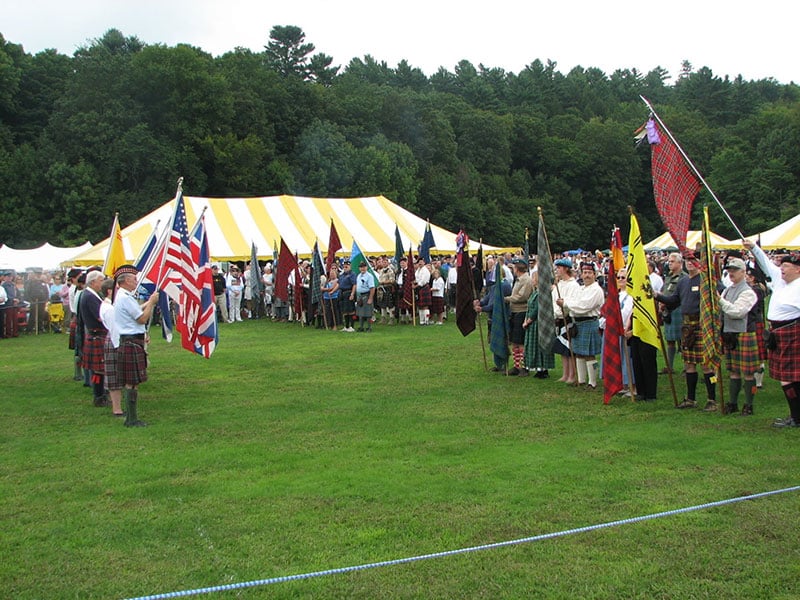
History compiled by Bruce Shields, SASVT Sennachie (historian)
Saint Andrew– The Patron Saint of Scotland
As Scottish emigrants moved all over the world, they formed self-help organizations to rescue Scots in need, and to succor widows and orphans of Scotsmen in many countries. The patron saint of Scotland is St. Andrew. The official flag of Scotland has long been the “saltyre,” the white X shaped cross on a blue background which is incorporated into the official flag of the United Kingdom known as the Union Jack.
First St. Andrew’s Society Originated in New York
The oldest organized charitable organization in the United States, known as the St Andrew’s Society, was founded in 1756 in the State of New York to provide help to stranded Scottish travelers and sailors. Alexander Hamilton was an active member. Hamilton’s wife (of Dutch ancestry) so admired the charitable work of the New York St. Andrew’s Society that she organized a charity for everyone else in New York, which a generation later became the New York Agency of Social Services.
Scots Among the Yankees
Vermont is known for its Yankee English heritage, but the Northeast Kingdom of Vermont was host to three organized emigration societies which brought several hundred Scots to farm and do business, most concentrated in Caledonia and Orleans Counties. Other than a handful of Presbyterian churches, those Scots had no social organization. For additional historical information see The Proceedings of the Vermont Historical Society.

St. Andrews of Vermont Society Founders
The founders of the Society were Robert Campbell, Hugh Laughlin, William Kennedy, Melvin MacKinnon, Sir Alasdair Munro Bt., Dorwin Thomas, Michael Ware, and Robert MacLellan.
At the first Tartan Ball, held in Williston, Dorwin Thomas was elected president. He served from 1974 -1978. William Lewis served the next two years, and then Sir Alasdair Munro became president. Alasdair [aka Atty] was famous for his theatrical recital of Burns’s “Address To The Haggis” for the Burns Dinner, and served as the flamboyant Grand Marshall of the Quechee Games.
The Vermont Society Grew Out of the First Highland Games Held in Quechee, VT
During the 1960’s and early 1970’s, entrepreneurs named Debbie and Hugh Laughlin opened Scotland by the Yard, a shop selling Scottish woolens and tartans, foods, and crafts in Woodstock, Vermont. Debbie, who operated the shop, invited a circle of friends to create an organization and promote Scottish culture to Scots and friends throughout Vermont.
By 1972, with assistance from Debbie’s group, Scotland by the Yard hosted a Highland Festival similar to those held throughout Scotland, somewhat analogous to County fairs, with vendors, piping, and Highland Games. Later Donald Ransom became the active manager of Scotland by the Yard, always with the active support of Debbie Laughlin.
Many Vermonters of Scots heritage, and many tourist visitors to the Woodstock region, thronged to the Highland Festival. About a dozen Vermonters who met at that first full-fledged Quechee event pledged to work to promote the Festival, and in that year decided to organize a St. Andrew’s Society dedicated to enhancing Scottish culture in Vermont.

The Creation of More Scottish Events
Within two years they developed a program to celebrate Robert Burns’s Birthday on January 15, to hold a Kirking of The Tartan event at Mosquitoville, to assist with the Quechee Highland Festival as an annual event, and to invite a strong Scots themed band from Ontario to help stage a full-bore formal Tartan Ball in November of 1973. They also provided backing to form the marching band Pipes and Drums of St. Andrew’s Society of Vermont.
The St. Andrew’s Society of Vermont Scholarship Foundation 1974-2022
Because of complexities in the Federal Tax Code, the St. Andrew’s Society could not easily function as a charity, and so in 1974 the St. Andrew’s Society of Vermont Scholarship Foundation was formed. The Foundation was able to invest donations and award scholarships and grants. In 2014, Don Ransom retired and ceased hosting the Quechee Festival. The Scholarship Foundation was unable to muster the finances and manpower to become the host, and the Festival was discontinued. After a one year hiatus, the Festival was revived by the New Hampshire School of Scottish Arts, presenter of the Festival since that time. The Foundation operated from 1974 to 2022, when it was dissolved.

